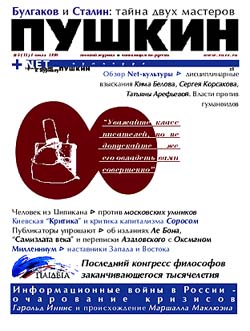
PUSHKIN #11. SUMMARY
Pushkin's 11th issue opens with a sustained metaphor eleborated by Leonid Kostyukov to represent the XXth century as a shot destined to kill evil. Another opening story comes from Andrey Paramonov, who writes about the upcoming XX International Congress of Philosophy.
Alexandra Belkina in her review of a separate edition of Mikhail Bulgakov's diary and letters raises the issue of relationship between the author and the powers that be by way of probing into various connotations of the word "Master" in the Soviet context.
A whole section is devoted to the famous communications theorist Marshall McLuhan and a lesser-famous Canadian, Harold Innis, whom McLuhan in fact saw as his teacher. Highlighting McLuhan's innovative thinking and style, Natalia Kozlova also seeks to reconstruct his ghostly presence in our culture, while Gunnar D.Hansson in his overview of Innis's work and career traces some origins of McLuhan's ideas on the role of communications in society. There is also a glimpse of these two authors' original work provided by extracts from Innis's "Russian Diary", where he shows the Soviet postwar life and human condition through the eyes of a foreigner, and by a clipping from McLuhan's foreword to his classical book "The Gutenberg Galaxy", postulating analytical principles for media-generating technologies.
Alexey Beglov in his review of correspondence between two philologists _ Mark Azadovsky and Yulian Oksman (1944-1954) _ sounds critical of the project's failure to provide a guide about their ideas. The article, contributed by Andrey Deryabin, is in fact an analysis of the publishing policy of the RAS Institute of Psychology behind another edition of "La psychologie des foules" ("The Crowd") by Le Bon.
Inna Bulkina in her article follows the sinuous history of a Ukranian magazine "Kritica", trying to draw out the dominant trends. Admitting that the latest issue has shown literature winning over ideology, she remains sceptical about the prospects for the magazine to give up its underlying ideological engagement in any forseable future. The review is accompanied with extracts from an article recently published in this magazine. This is a text by George Soros, in which he warns against another enemy of the open society, which is no longer the communist but the capitalist threat.
Nikolay Biryukov shares his ideas on teaching Oriental philosophy, sifting out currently available text editions, guides and reference books for their merits and weaknesses. Galina Zykova offers a review of a newborn manazine "Na Postu", interpreting its prevailing negative criticism as another variety of light reading.
The next section treats the subject of samizdat. A recently published encyclopedia of samizdat, called "Samizdat of the Century", calls forth three different responses. The first comes from Mikhail Novikov, who finds the book a realistic, though somewhat arbitrary and skimpy view of his time. Pyotr Pryzhov criticizes the authors for poor knowledge of the issue at hand and total lack of intuition, while Vladimir Tuchkov, praising the project for its comprehensive character, suggests an extremely broad definition of "dissent". The other samizdat-related event, highlighted in the section, is the "Preprintium" exhibition, presently held in Berlin, which emphasizes the Moscow samizdat as a cultural phenomenon essentially limited to collective memory.
The "Not Far from Moscow" section carries three short essays by Alexandr Vernikov, where he looks at Yekaterinburg and mythology around it, including the most recent myths (transport indexation, monuments and metro), as well as earlier images (P.Bazhov and echoes of the Finnish Kalevala)
Another three texts come under the heading "This Is the Way We Do It". Georgy Vinokurov offers an explication of some pages in the "information war" of 1997, interpreting the latter as a specific technology of power, potent of mythologyzing events and processes. Alexandr Oslon establishes a link between the local "information space" and mental "lands" of the current mass consciousness. Finally, Gleb Pavlovsky in his review of "The Technology of Evil" by K.Lindenberg resorts to the present situation in Russia to explore the mechanisms and limitations of the strategy of controlled crises.
Sergey Kornev, in his opening article for the "Millennium" section, proceeding from the generally accepted understanding of postmodernism as a negation of Western culture, puts forward his version of orientalized postmodernism as a chance for Oriental cultures, previously supressed by Western culture, to "break away from alien cultural logic and tap their own sources of vigour". This time Viacheslav Glazychev chose a "Hortus Daemonum" by A.Makhov to dissect and discern a number of textual layers in it, i.e.: informative, historical, spiritual and intellectual. Oleg Genisaretsky, proceeding from the book by J. Bugental "The search for existential identity", suggests that psychotherapy texts be viewed as a new genre of literature on the grounds that the role of psychotherapist in "the theatre of culture" has changed dramatically. The section is crowned with a lengthy essay on the recently held "First Gefter Conference", giving a multidimentional portait of Gefter as a thinker and as a person.
Apart from covering the latest Internet news in the "Sweep-net" rubric the "Net-Culture" section also undertakes to discuss the currently unfolding resistance to the monopoly of computer giants in the USA (Anton Nosik); confrontation between online and offline as two types of organisation or two different ideologies of the cyberspace reality (Andrey Lyovkin); Kali, a goddess in Hinduism, present in Internet as a myth and as a game simultaneously (Tatiana Arefieva, Kim Belov and Sergey Korsakov). An interview by Dmitry Ivanov with Anton Borisovich N. reveals the practice and principles of building virtual characters. This kind of net games is further illustrated by "Mail of Spirits". Anton Nosik in his polemics with Umberto Eco advocates hypertext for its ability to break the linear construction of genre and plot. S.Kurius makes a further contribution to the topic of net literature, arguing that cyberspace works by Davis Grave can successfully compete with the bulk of current paper prose.
|

